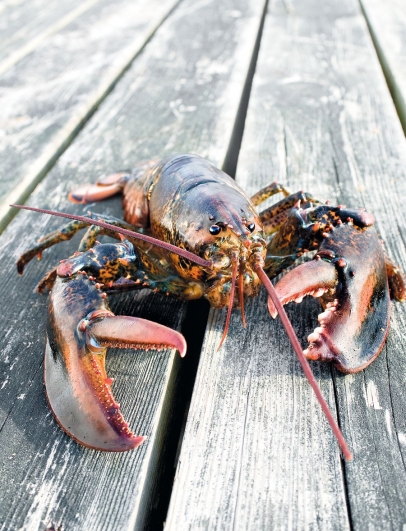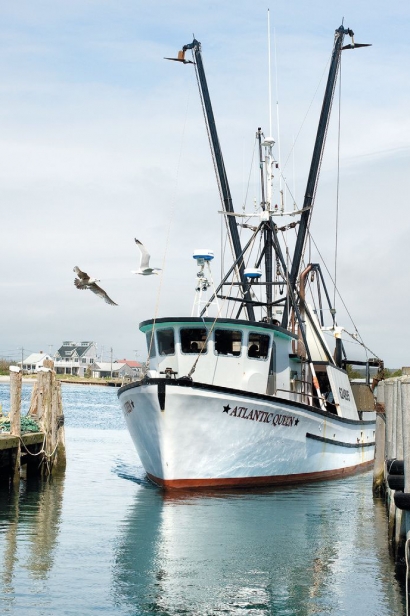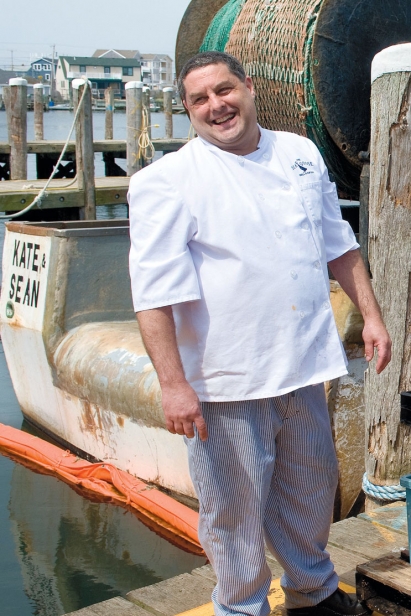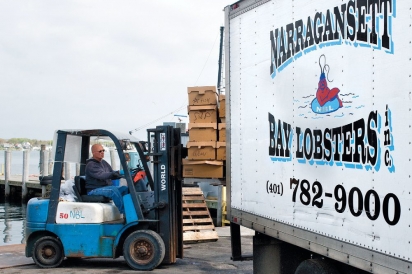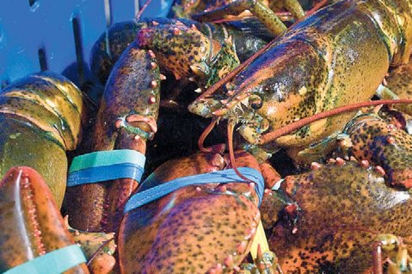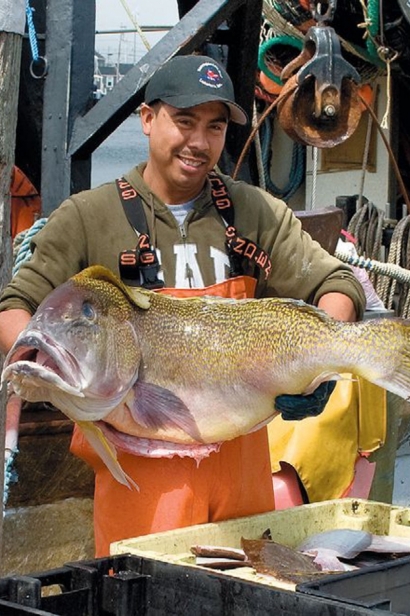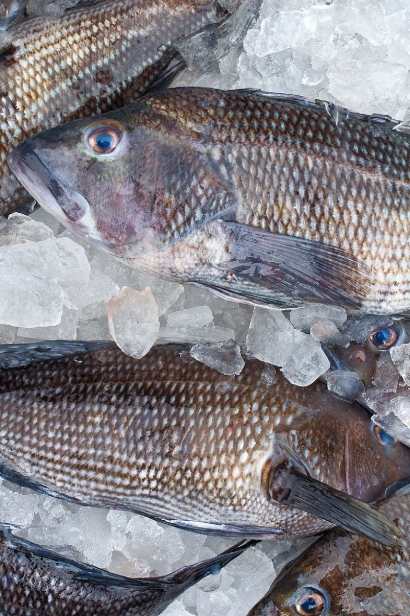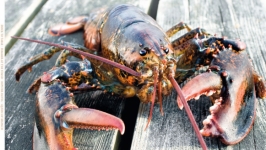From Dock to Table: On the Wharf with Chef Andrew Nathan and Seafood Broker Tom LaFazia
When Westerly chef Andrew Nathan wakes up on any given day that his restaurant, the Sea Goose, is open, he calls up Tom LaFazia and asks, “What’s coming in today? How was it caught? What does it look like?” LaFazia is the sales manager and all-around negotiator for Narragansett Bay Lobsters, Inc. (NBL), in partnership with Adam and Lee Morse, who founded the business in 1993.
When the Morses decided they wanted to expand from lobsters into a full seafood line in 2008, they brought in LaFazia. As a kid growing up on Jamestown, he inhaled the smells of fishing boats right along with salt air, and by the time he was 17, he was driving a truck for seafood deliveries, moving on from there to cutting steaks and fillets.
“On the cutting floor, I could see the different quality of stuff coming in and out, and I decided to get involved in the buying,” LaFazia recalls. “Nowadays that helps me be candid with customers and deal with everyone on a personal level. It’s like going to a butcher—people want to know what they’re getting.”
“If you’re a seafood buyer for a restaurant, you have to be able to trust your broker,” Adam Morse agrees. “You can trust Tom. Having a guy like Tom is what we’re selling.”
NBL has 250 wholesale customers, from southeastern Massachusetts down to New Haven, with dozens of restaurants, fish and specialty markets in Rhode Island and even Stop & Shop. They strive to get local seafood, when possible, and they still have 40% of their business in lobsters, with one of the regular boats they buy from bringing in anywhere from 5,000 to 10,000 pounds in one load. Their holding tanks can contain up to 50,000 pounds, which they can flush daily directly from outside seawater. (NBL also has a small retail shop on the street side of the building.)
There are daily online seafood auctions in New Bedford and Boston, and LaFazia does all his buying from a tiny office that looks onto the dock in one direction and onto the cutting floor in the other. He relies on “graders” at the auctions to whom he pays commissions to alert him about the catches coming in and to advise him about what looks good to buy. If NBL receives something “not up to snuff,” LaFazia and Morse ship it back to the source.
“We want the chefs to be confident about the quality of fish we send them,” LaFazia emphasizes. “And traceability has become such a big thing: Where did the fish come from?”
NBL will also buy from rod-and-reelers, from gill-netters, and from day boats. They’re not equipped to take thousands of pounds of squid or huge amounts of other fish, but they stick to a premium product. LaFazia stresses that they are more of a processing place than a storehouse. But staying small keeps the quality high.
Nathan can’t say enough good things about his relationship with LaFazia, whom he refers to as “not just a facilitator and a broker but a very dear friend.” Nathan, who started out cooking in New York City, says, “I’ve never seen quality like this. I couldn’t keep going in the winter, if he didn’t get in fabulous flounder, pollock, haddock, etc.”
He underscores Rhode Island’s short summer season for fish (12–14 weeks). During that small window, he has a half dozen or so fishermen local to his eateries in Westerly—Nathan co-owns the Cooked Goose, as well as the Sea Goose, with wife Jennifer Gibson—who specifically give him first choice of their catch. He gets bluefish to smoke, some squid and scallops, the blink-or-you-might-miss-them tautog and striped bass.
Nathan outlines other aspects of the summer season: “The first thing is the flounder; then we’ll see a lot of gorgeous monkfish in June, then by mid-July, there’s beautiful swordfish and tuna. There’s even mahi-mahi around and lots of tilefish. My favorite thing in June is scup, a small boney fish, but you take the bones out and cook it with love—there’s nothing better than that!”
“All we’re trying to do at the restaurant is to respect the product,” he adds. “We buy the very best we can, do very little with it and serve it nicely.”
That might include sautéed skate wings with blood orange grenobloise (butter, capers, parsley and citrus) or lobster nachos (!), Asian-style fried calamari (with rice noodles, peanuts and Thai chili sauce) or clam chowder, lobster bisque or a seafood stew of local shellfish in a saffron tomato broth.
Both LaFazia and Nathan mentioned the difficulties for present-day fishermen, needing to make costly seven-day trips out to Georges Bank to make their catch worth their time. But Nathan explained that, aside from the depleted cod, Georges Bank is still teeming with fish.
When LaFazia can’t get local fish (off the coast of Cape Cod or Block Island), he relies next on domestic fish, such as the North Carolina long-line boats that bring in swordfish or the Washington State salmon, when it runs. Nathan is adamant that the shrimp he uses be sourced from the Carolina coast or from Texas and Louisiana, not Mexico and not Asia. His oysters are as local as can be: from his brother-in-law Rob Krause, who farms them in Ninigret Pond (his business is Ninigret Oyster Farm and he is a founding member of the Ocean State Shellfish Cooperative).
“People are gradually learning how it all works,” LaFazia points out. “And some of the bigger markets are getting involved with this local movement, trying to accommodate all of their consumers’ desires. And they’re beginning to learn that good quality creates better relationships all around.”
Morse concurs: “Sometimes I’ve noticed that when a restaurant buys a cheaper product, they go out of business within a year. The consumer knows what good fish tastes like.”
Certainly that’s what Chef Andrew is always going for. If he doesn’t want to eat it, why would his customers?
“I want to use everything locally that I can, and there are some fantastic local products out there,” he notes. “But the seasonal patterns of fish won’t change, and sometimes we just can’t stay strictly local. But we will always stay strictly quality.”
To dine on fish just off the boat, visit:
The Sea Goose
265 Post Rd., Westerly, RI; 401.315.0788
To purchase fish just off the boat, visit:
Narragansett Bay Lobsters
268 Great Island Rd., Pt. Judith, RI; 401.315.0788


